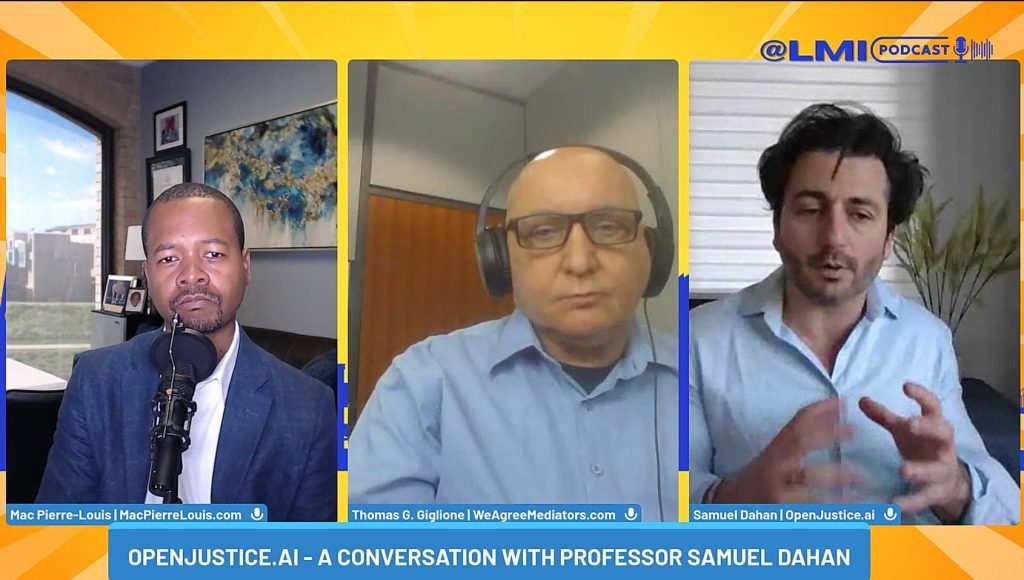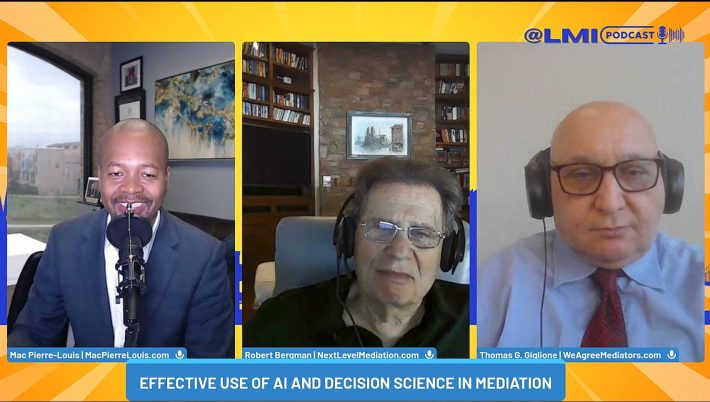EP 239 OPENJUSTICE.AI – A Conversation with Professor Samuel Dahan

Law Professor Samuel Dahan of Queens University discussed OpenJustice.ai with Mac Pierre-Louis and Thomas G. Giglione of WeAgreeMediators.com. Samuel discussed the development of legal AI systems and the lead he and The Conflict Analytics Lab has taken in developing OpenJustice.ai in the push to popularize access to justice applications. Samuel has participated in other such applications with the Lab, such as the Vaccine Mediator, which was discussed on the LMIPodcast October 2021.
Some Topics Discussed were:
Integration of OpenJustice.AI into mediation practice
Integrating OpenJustice.ai into mediation processes requires improved design thinking and user experience (UX) design. Efforts are underway to create a custom model specifically tailored for negotiation and mediation by incorporating ADR literature alongside legal data. The goal is to humanize the assistance provided by AI during mediations by offering a range of options based on both legal principles and practical considerations.
Challenges and considerations in developing domain-specific legal AI
Domain-specific training is essential for tailoring legal AI systems to meet the needs of professionals while avoiding general-purpose models’ limitations. Evaluation through impact assessment by Harvard Access to Justice Lab aims at determining if these systems are truly beneficial or potentially harmful. Considerations include addressing issues such as hallucination in providing diverse answers aligned with how lawyers approach client queries.
Concerns about generalized AI in legal tasks
Generalized AI like GPT should not be used for legal tasks due to issues such as fluctuating performance, lack of diversity in reasoning, and opacity regarding training data. New post-GPT legal AI systems are yet to demonstrate clear outperformance compared to generalized AIs, raising concerns about their cost-effectiveness. Multiplicity, diversity in narratives, is crucial in negotiation and mediation contexts where reliance on mainstream views can be limiting.
Impact and expansion of OpenJustice.AI
OpenJustice.ai is operational in more than 25 schools, courthouses, libraries, with plans for further expansion globally. Collaboration with Harvard A2J Lab aims at evaluating the impact of legal professionals using the platform in courthouses and pro bono centers. Industry partnerships including Ernst & Young and Miller Thompson involve creating distributed systems tailored to their data without sharing it with others using OpenJustice.ai.
OpenJustice.ai and its role in the legal community
Having access to cutting-edge research or drafting technology for lawyers is essential for the community and access to justice. OpenJustice.ai has evolved into a community project, with colleagues from different countries creating their own localized versions of the AI. The system aims to provide an open-source service functional for the entire community while protecting proprietary data held by industrial partners.



